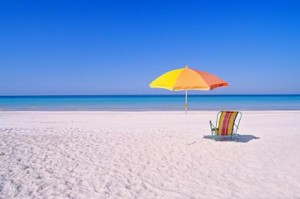Another Update from Orange Beach, Alabama Tourism
Hey all. Here’s the most recent info from Alabama. Daily updates are available at thebeachfacts.com
Like everyone along the Gulf Coast, the CVB is monitoring the clean-up of the Deepwater Horizon oil spill and relying on official updates from the Unified Command response team and local emergency management officials for information. We will continue to post confirmed updates as they become available.
- We experienced significant oil impact across the island this week as a result of stronger winds and surf brought on by Hurricane Alex. While the storm did not directly affect our area, it continues to have an impact on the amount of oil reaching our shores and the ability for clean-up. Conditions for clean-up are expected to improve throughout the weekend as weather conditions change.
- If double red flags are being flown at a beach area, it means the water is closed to swimming. This is different from a swim advisory, in which individuals are discouraged from swimming. In Gulf Shores it is illegal to swim when double red flags are in effect. Currently, double red flags are being flown in most beach areas as a result of strong surf and oil.
- Regardless of the color flag being flown, the Alabama Department of Public Health has issued a swimming advisory in gulf waters off Gulf Shores, Orange Beach and Fort Morgan, and in bay waters immediately adjacent to Fort Morgan, in Bayou St. John, Terry Cove, Cotton Bayou and Old River. A swimming advisory means that individuals are discouraged from swimming in affected waters. To read advisory information and frequently asked questions, visit the Alabama Department of Public Health website.
- The Alabama Department of Conservation & Natural Resources has changed the closure order for the following back bay areas to “Idle Speed Only, No Wake“: Alabama waters south of a line running from the southernmost tip of Bear Point to the eastern shore of the mouth of Ono Harbor. This includes Bayou St. John, Terry Cove, Terry Cover Harbor and all canals entering these waters. However, other areas remain closed to all recreational vessels and watercraft.
- On June 24, the Alabama Department of Conservation & Natural Resources opened all state waters for recreational catch-and-release fishing only. This includes all gulf waters out to the three-mile state/federal line. Anglers are reminded to stay clear of booms and booming operations, all working vessels, and areas with visible oil and/or sheen. The pier at Gulf State Park is also reopened for catch-and-release fishing. For full information, click here.
- The City of Gulf Shores has temporarily waived parking fees at public beach areas.
- The West 6th Street and Little Lagoon Pass public access and parking areas remain closed for an undetermined length of time. These areas are being used as work sites and staging areas for beach cleaning operations. The same is true for the parking area at Florida Point beach access. Several other public beach areas are being used as staging and operations areas even though they are not technically closed.
- If you have questions about conditions at a specific property location, please contact your rental management agent for accurate and up-to-date information.
- According to NOAA, tarballs DO NOT pose a health risk to the average person. However, beachgoers are advised not to pick them up or bury them and asked to report any sightings. To report sightings of oil or tarballs on the beach, please call 866-448-5816.
- Fishing of any kind is still prohibited in the closed area of federal waters, which currently includes an area from Louisiana to Panama City, Florida. To view a map of the closed area, go to http://sero.nmfs.noaa.gov/.
- Skimming vessels are at work in Perdido Pass. A more long-term system of piping that will funnel oil away from the pass into a collection area is underway and is expected to be complete soon.
- For detailed information about the entire incident, including spill trajectory maps, visit the NOAA (http://response.restoration.noaa.gov/) or Deepwater Horizon (www.deepwaterhorizonresponse.com) response sites.





June 25, 2011 @ 2:41 am
Wow! Thank you! I continuously needed to write on my site something like that. Can I take a fragment of your post to my blog?